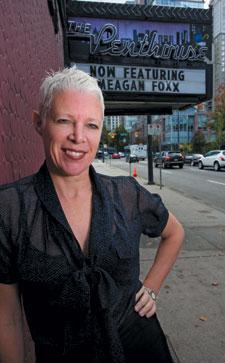In her new book, Burlesque West: Showgirls, Sex and Sin in Postwar Vancouver, queer University of BC sociologist Becki Ross takes the reader on a rollicking good ride through the eye-popping erotic stage shows and strip clubs of the wild West Coast.
If you’re rolling your eyes and wondering why such a book merits mention in a gay publication, Ross has two words for you: sexual rebels.
Ross takes the reader back several decades for a trip through the big-production nightclub stage numbers which drew internationally renowned dancers to today’s peeler pubs.
Drawn from 50 first-person accounts of former dancers, strip-club owners, booking agents, choreographers and musicians, Ross recounts stories that are richly textured about an era before “striptease fell from grace because the world stopped dreaming,” in the words of ex-dancer Lindalee Tracey.
Ross presents a vibrant history of a trade that demands athleticism, business sense, a tough hide and no small measure of theatrical ability. Not to mention stunning costumes and stage props the costs of which ran into the thousands of dollars.
It’s a history of strong women told through the women’s eyes, with additions from the men who ran the clubs and in many cases created their costumes and choreography.
It’s an important history for the queer community to know, Ross says, because just as our community has had to fight stereotyping, discrimination and unjust laws, so have erotic dancers.
“They don’t conform, they resist, they challenge, they overthrow conventions,” she says.
“I think queer people need to stretch beyond our understanding of what it means to be queer to understand how we’ve been attacked with the blunt instrument of morality,” she adds.
Morality attacks are an issue that comes back again and again in Burlesque West – whether it’s from the dancers being reviled, to the raids on clubs such as The Penthouse which police shut down for several months after a December 1975 raid, or the racial segregation of dancing on Vancouver’s east-west divide before the middle of the last century.
While some clubs such as The Cave, The Palomar and Isy’s Supper Club downtown held a somewhat respectable reputation, others like The Shanghai Junk, The Smilin’ Buddha and The Harlem Nocturne were looked at askance due to their geographic location on the city’s eastside.
But, Ross notes, it was eastside clubs such as the New Delhi that were home to transvestites and transsexual dancers.
“There is little doubt that that the East End cabarets pushed hardest against community standards,” she writes.
It’s a subculture that was rife with queers, be they costume designers, club owners or dancers.
Another similarity between the queer and burlesque cultures, Ross notes, is the closeted nature under which some women had to exist, using stage names to mask their identities.
One of the striptease bars that comes up again and again is the legendary lesbian hangout The Vanport.
Ross quotes musician Gord Wilkson as saying The Vanport in the 1970s was “a real serious dyke, prison guard, truck driver bar… All the girls had ducktails, pretty tough looking, cigarette packs. Once in a while some poofy guy would wander in and ask somebody to dance, but he’d be pushed away.”
Throughout the book Ross manages to avoid the trap so many academics fall into when they pursue research and then produce a mass-market volume. So often, academic writing is the purview of those trying to write terrifically long sentences with as many polysyllabic words crammed in as possible.
Not so in Ross’ case.
Burlesque West is about entertainment and is itself entertaining. What’s more, Ross knows she’s straddling two worlds with the book. As an educator, she knows she needs to teach. And as a writer on popular culture, she knows the need to delight. Burlesque West accomplishes both.
Ross also knows she’s writing about a subject which many will view with a jaundiced eye.
There was no shortage of detractors when Ross first got a $50,900 research grant from the Social Sciences and Humanities Research Council of Canada to pursue the research which resulted in the book.
The critics went as far as The Reform Party castigating the Jean Chrétien-led Liberals in The House of Commons for a gross misuse of public money.
In facing her foes, smashing stereotypes and being relentless in her 11-year research project, Ross has pulled back the curtain on a little-known part of BC’s queer, entertainment and labour history with this valuable tome.
And that’s public money well spent.

 Why you can trust Xtra
Why you can trust Xtra


